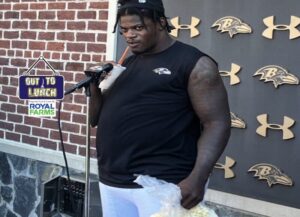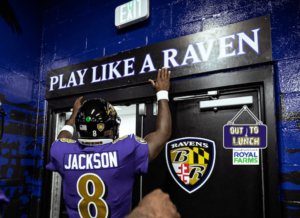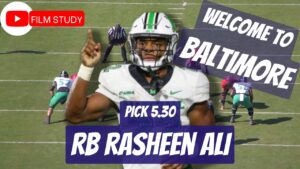Despite the promise of just a few weeks ago, the Baltimore Ravens’ 2013 season came to a final, miserable end with their excruciating loss to the Cincinnati Bengals in a game that ended up meaning very little to the Bengals, but everything to the Ravens.
The loss ended a five-year run of making the playoffs under John Harbaugh, including three AFC Championship Game appearances and last season’s Super Bowl win.
But this year it just wasn’t meant to be.
The collapse began far earlier in the season when Baltimore took the ends of games off against teams like the Green Bay Packers, Chicago Bears, Pittsburgh Steelers, Cleveland Browns and the entire game off against the Buffalo Bills, all for losses in games that could have been wins. Had the Ravens found ways to win even three of those games, the loss to the Bengals Sunday wouldn’t have mattered.
The Ravens still would have made the playoffs, perhaps not with a great seed, but they’d be in the dance. They should have made it in this season and could have with just a win. Sunday’s loss hurt especially in knowing that with just a win against the Bengals, the Ravens would have made it in with the Jets’ win over the Dolphins.
This year’s Baltimore Ravens are very deeply flawed with the league’s worst offensive line, worst running game, badly struggling quarterback, and a largely non-existent pass rush despite, on paper, some of the best performers in the league in that regard in Terrell Suggs and Elvis Dumervil. But those two were largely invisible in any game that mattered this season, especially against the Patriots and Bengals.
The offseason will be long and miserable for this team as it gets ready to say goodbye to much of the remainder of its Super Bowl team that now seems just a distant memory away from the disappointment of this season.
Offensive coordinator Jim Caldwell should probably be the first person let go by head coach John Harbaugh. Caldwell, who had been so successful as quarterbacks coach of the Indianapolis Colts, helped Baltimore win a Super Bowl after a late-season change from Cam Cameron in 2012. But Caldwell had never been an offensive coordinator before, though he had been a head coach. It showed this year.
Caldwell’s offensive play-calling has been vanilla and predictable, game-after-game. The utter lack of imagination in the Ravens offense was best illustrated in the 41-7 humiliation at home at the hands of the New England Patriots.
The Patriots guessed right, as Baltimore Sun columnist Mike Preston pointed out, on nearly every offensive play call. They knew what was coming before it happened. Unlike the 2000 Ravens’ divisional playoff game against the Tennessee Titans (who actually possessed the Ravens playbook) the Patriots could just the see plays coming. It was that bad. Caldwell should be fired, along with “run game coordinator” Juan Castillo, the leader of an offensive line scheme change/experiment that failed horribly.
In Caldwell’s defense, quarterback Joe Flacco has had no running game to work with and no time to throw. The league-worst offensive line has helped Flacco lead the league in quarterback sacks and hurries. With no time to throw there isn’t much room for creativity in scheme. But Caldwell failed to adjust his scheme seemingly at all. He didn’t spread the field and run a West Coast offense with a poor line, which is one way he could have avoided the pass rush. Caldwell and Flacco ran the same tired plays and got the same, pitiful results.
[cardoza_wp_poll id=”1052″]
The selection of Marshall Yanda as a Pro Bowler suggests that the annual NFL All-Star game is still based on reputation rather than hard-earned success in a given year. Yanda’s season has been lousy, or subpar at best. Sadly, he’s been one of the best on the line considering the woes of his compatriots.
When active Kelechi Osemele was largely ineffective partly due to injury. The Ravens finally acknowledged that mid-season in putting Osemele on injured reserve. Michael Oher, on his way out the door, has just been bad. His pass-blocking has varied from nonexistent to poor. His run-blocking has been average at best.
Gino Gradkowski would be considered the worst of the unit, except that Bryant McKinnie was perhaps even worse than him until he was traded to Miami. Then Gradkowski took over that mantle with bad game after bad game. The second year man, first year as a starter, has been unable to handle defense after defense and has been out-sized and out-muscled game-after-game. Gradkowski represents a rare draft bust for the Ravens who usually get playmakers at the line positions but clearly misfired on picking an undersized center and throwing him into the fire.
The only bright spot this year has been Eugene Monroe, obtained in a trade from Jacksonville, but he’s a free agent, and it is unclear if Baltimore can afford to keep him.
The cuts, some of them, are obvious. Ray Rice, a big cap number, is gone. Either Terrell Suggs or Haloti Ngata will be gone too. The prediction here is that it will be Suggs who, has been ineffective throughout the second half of the season, despite, like Yanda, getting a seemingly honorary Pro Bowl nod. Ngata has played better near the end of the season but the Ravens have to decide if Brandon Williams is ready to replace him.
Ed Dickson is probably gone unless he’s willing to take the bare minimum to stay as the Ravens will need to keep Dennis Pitta. Jacoby Jones should be re-signed but he could end up pricing himself out of Baltimore’s range with yet another good season at special teams if he wants wide receiver money. Hopefully Ozzie Newsome doesn’t repeat last year’s bad decision-making on Anquan Boldin and can find a way to keep game-changing returner Jones.
With a non-existent running game the Ravens will probably bid adieu to Vonta Leach who has been, once again, largely invisible in the offense as the running game hasn’t given him much to do but cheerlead from the sidelines.
Marlon Brown is one of the few bright spots to emerge out of the season. He has shown big-game potential and made some huge catches this season, but the loss of Boldin proved an even worse decision with Baltimore having no answer to teams double-covering Torrey Smith with Brown not possessing Boldin’s ball skills or his ability to make highly contested catches.
One particular area of absence has been the long ball. Joe Flacco has rarely connected on deep passes this year, but spent a lot of time on the sideline watching Andy Dalton of the Bengals, Aaron Rodgers of the Packers and others connect left and right.
This is an area where the Ravens flat out beat other teams since 2009. But without the Ravens being able to run, teams have been able to pack the safeties deep and choke the Ravens’ vertical game. Flacco has also time and again missed open receivers or thrown passes that floated too long, missing big play scoring opportunities.
The Red Zone offense has been abysmal, but that goes back to everything from Caldwell’s poor play-calling, Harbaugh’s bad decision-making as coach, poor pass protection, non-existent running game, and the resurfacing of Flacco’s old awful habit of locking in on one receiver when others have been wide open. When teams can predict what is coming, it is a lot easier for them to make plays.
The ONLY areas that have been good have been, overall, the secondary and special teams, and, before the last two games, the Red Zone defense. After the first game debacle, and the switch to Matt Elam over Michael Huff, the Ravens have been strong in the secondary with the real emergence of Jimmy Smith. But the unit has nevertheless had tremendous problems on third down, where covering short routes, screens and anything middle-of-the-field, has been challenging all year long.
The Ravens had led the league in three-and-outs, but many of those came in games against bad teams where those teams had no offensive production at all.
The Red Zone defense had been good at keeping teams out of the end zone, but the Patriots laughed their way to a three-for-three in that area in Baltimore (which is something that should never occur at home) and then the Bengals giggled their way to three-out-of-four when the score of that game mattered. With the season on the line, the defense was terrible.
Harbaugh should get a lot of the blame too. His coaching decisions in game-after-game were questionable. His clock management has been poor much of the season, but his nonchalance in games has been downright startling.
In the first game of the season, before the Broncos contest became a blowout, Harbaugh failed to challenge a non-catch by Wes Welker, leading to a Broncos touchdown and changing the momentum of the contest against a team that you can’t allow free scores.
The Bears game was another example of poor play-calling and decision-making, as well as the decision to try for points against the Packers, which led to a turnover and a chip-shot field goal. 6-2 at home wouldn’t be bad for most teams, but the pathetic play of the Ravens on the road, 2-6, meant that home games couldn’t end up losses.
The Ravens were especially bad in their own Division which had been a carnival against teams except the Steelers under Harbaugh before this season. With the loss to Cincinnati, Baltimore ended up just 3-3. That won’t win you anything.
The Browns are better, the Bengals are great already and continue to rack up tons of draft picks to supplement their future for years to come. The Steelers will be back stronger next year.
Newsome, even with salary cap constraints, made lots of bad decisions in the offseason, starting with cutting Boldin. He was far from the “Wizard of Oz” he’s known for being in what was a rare bad offseason. A lot of what happened was not Newsome’s fault. He couldn’t have predicted an offensive line that would have been this bad or the unexpected injury to Pitta, plus the retirements of Matt Birk and Ray Lewis. Newsome will need to work hard to turn things around this offseason.
2013 was a lost season. There’s plenty of blame to go around. But the one thing that is for sure is that decision to slice the roster apart after the Super Bowl was an experiment that failed, miserably.








